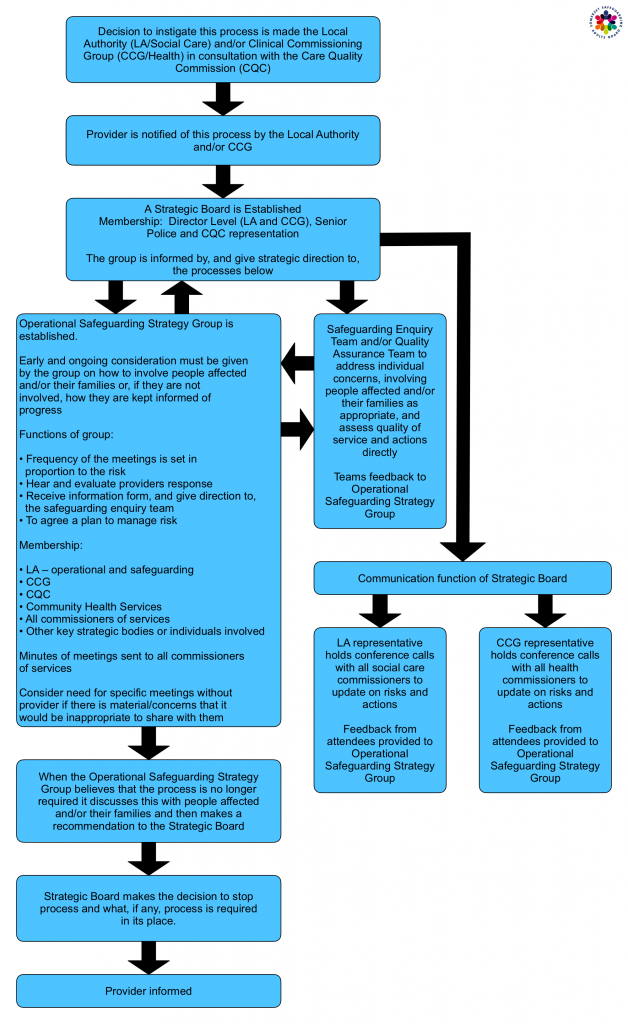Introduction
How we manage safeguarding enquiries for a service when there are multiple commissioners
Somerset Council has adopted the principles set out by the Association of Directors of Adult Social Services (ADASS) in their guidance dated June 2016
Safeguarding referrals generated within Somerset for an adult placed from another authority will follow the same robust process and the principles of Making Safeguarding Personal as other safeguarding referrals, with the addition of the principles and processes set out below.
The following principles are within the guidance document above and all references to ‘host authority’ is taken to be Somerset Council.
- The host authority will have overall responsibility for co-ordinating the safeguarding adults enquiry and for ensuring clear communication with all placing authorities and other stakeholders, especially with regards to the scheduling of meetings and the planning of the enquiry.
- The placing authority will have a continuing duty of care to the adult at risk of abuse or neglect that they have placed.
- The placing authority will contribute to the enquiry as required, and maintain overall responsibility for the adult they have placed.
- The placing authority should ensure, through contracting arrangements and in service specifications, that the provider has arrangements in place for protecting adults at risk of abuse or neglect and for managing concerns, which in turn link with local (host authority) multi-agency safeguarding adults policy and procedures/guidance. This includes the requirement to inform the host authority of both adults and placing authorities affected by the safeguarding concerns.
Authorities may negotiate flexible arrangements, for example relating to another authority undertaking assessments, reviews, investigative activities or other supportive activities on behalf of a placing authority. In such cases, the placing authority would maintain overall responsibility for the person they have placed, and reimbursement would be required and agreed as part of such negotiations.
Providers of care and support services have rights and responsibilities, and may be required to undertake their own enquiries. The host authority must ensure effective and timely communication with the provider of care throughout the enquiry investigation. You can find the process for this below.

Step one:
Decision to instigate this process is made the Local Authority (Local Authority or Social Care) and/or Clinical Commissioning Group (Clinical Commissioning Group or Health) in consultation with the Care Quality Commission (CQC).
Step two:
Provider is notified of this process by the Local Authority and/or Clinical Commissioning Group.
Step three:
A Strategic Board is Established Membership: Director Level (LA and CCG), Senior Police and CQC representation. This group is informed by, and give strategic direction to, the processes below:
Step four:
Operational Safeguarding Strategy Group is established.
Early and ongoing consideration must be given by the group on how to involve people affected and/or their families or, if they are not involved, how they are kept informed of progress
Functions of group:
- Frequency of the meetings is set in proportion to the risk
- Hear and evaluate providers response
- Receive information from, and give direction to, the safeguarding enquiry team
- To agree a plan to manage risk
Membership:
- Local Authority – operational and safeguarding
- Clinical Commissioning Group
- Care Quality Commission
- Community Health Services
- All commissioners of services
- Other key strategic bodies or individuals
Minutes of meetings sent to all commissioners of services.
Consider need for specific meetings without provider if there is material or concerns that it would be inappropriate to share with them.
Step five:
When the Operational Safeguarding Strategy Group believes that the process is no longer required it discusses this with people affected and/or their families and then makes a recommendation to the Strategic Board.
Step six:
Strategic Board makes the decision to stop process and what, if any, process is required in its place.
Step seven:
Provider is informed.
Step eight:
Safeguarding Enquiry Team and/or Quality Assurance Team to address individual concerns, involving people affected and/or their families as appropriate, and assess quality of service and actions directly.
Teams feedback to Operational Safeguarding Strategy Group.
Step nine:
Communication function of Strategic Board.
- Local Authority representative holds conference calls with all social care commissioners to update on risks and actions. Feedback form attendees provided to Operational Safeguarding Strategy Group.
- Clinical Commissioning Group representative holds conference calls with all health commissioners to update on risks and actions. Feedback form attendees provided to Operational Safeguarding Strategy Group.

